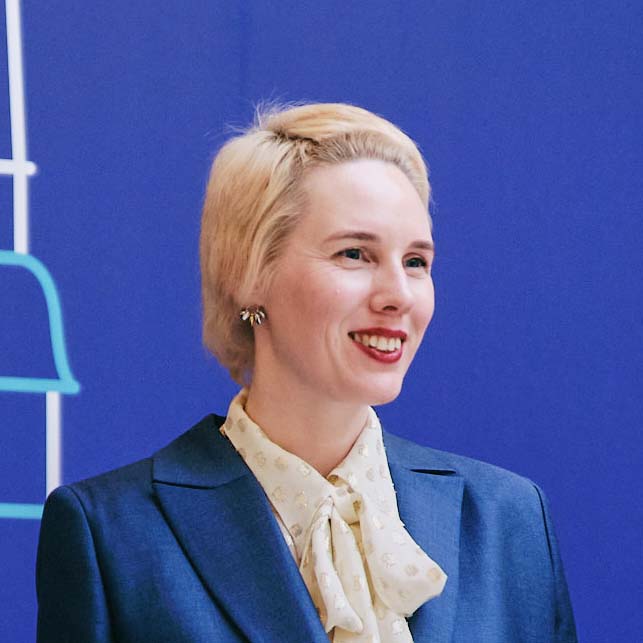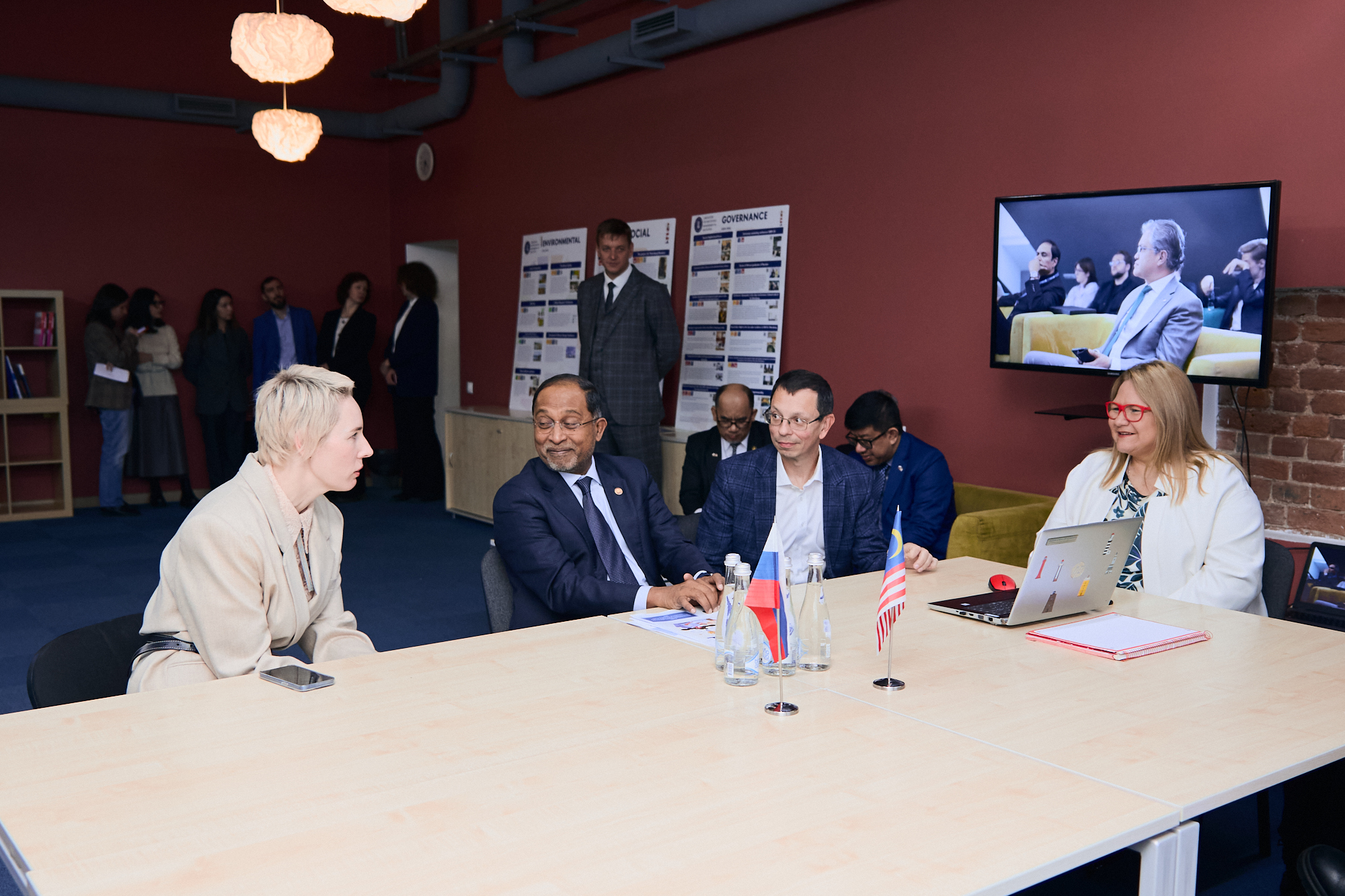Mirror Laboratory of HSE and UTM Shares Its First Achievements

In autumn of 2024, a delegation from Malaysia, led by Minister of Higher Education Zambry bin Abdul Kadir, visited the HSE campus in St Petersburg. One of the key topics of discussion was the initial results of the mirror laboratory, a joint initiative between HSE University-St Petersburg and the University of Technology Malaysia (UTM).

Anna Tyshetskaya, Director of the HSE Campus in St Petersburg
‘The HSE campus in St Petersburg has taken the initiative to engage with the Asia-Pacific region, including Malaysian universities. This is an important direction for us, as universities in the Asia-Pacific region have made significant progress in global and subject-specific rankings in recent years. Additionally, Asian universities are highly attractive in terms of academic mobility for students and provide a comfortable environment for establishing business contacts and communication.
Developing mutually beneficial relationships with universities in the Asia-Pacific region is primarily a practical endeavour. In collaboration with colleagues from UTM, we have established a mirror laboratory in the field of management and launched a joint student business incubator at the St Petersburg campus. This approach supports technological leadership and allows students to put their entrepreneurial ideas into practice.
Educational cooperation with Malaysia is of great importance to HSE University-St Petersburg. Among our partners are five leading Malaysian universities. The establishment of a joint mirror laboratory with UTM has elevated our collaboration to a new level. We continue our work and look forward to new projects with Malaysian universities.’

The Satellite Laboratory for Social Entrepreneurship HSE SPB – UTM Malaysia, established in 2023, has become a unique platform for promoting social entrepreneurship as a tool for sustainable development. Bringing together researchers, students, and practitioners from different countries, the laboratory has achieved impressive results. Magdalena Alejandra Gaete Sepulveda, head of the laboratory, shares insights on its creation, team, initial outcomes, and future objectives.
Magdalena Alejandra Gaete Sepulveda
— How did the collaboration between HSE University-St Petersburg and UTM start and develop?
— At our first meeting with colleagues from the Azman Hashim International Business School (AHIBS) at UTM in July 2023, we saw opportunities for interdisciplinary collaboration between the Laboratory for Reputation Management in Education (RepLab), which studies reputation management and sustainability in higher education, and ACT LAB at AHIBS UTM. This partnership focuses on working with the fourth sector (social entrepreneurs) and sustainable development within the framework of the Quintuple Helix model (this model describes the interaction between universities, industry, government, society, and the environment within a knowledge-based economy).
Just three months after our initial meeting, teams from HSE University-St Petersburg and UTM developed a joint action plan to advance the project. Our joint work highlights the speed and efficiency with which both teams were able to coordinate their efforts and resources to advance research and interdisciplinary activities within the framework of the established collaboration.

It is worth noting that in May 2023, our university rectors signed a memorandum of understanding at the International Economic Forum ‘Russia–Islamic World: KazanForum.’ The collaboration between HSE University-St Petersburg and UTM began with the establishment of the Mirror Laboratory for Social Entrepreneurship, a result of international academic cooperation. This partnership was officially formalised in November 2023 during a visit by the Russian Minister of Education to Malaysia.
This partnership also includes the development of strategies and innovations in this field, highlighting the multidisciplinary nature of the project. The laboratory actively collaborates with government organisations, NGOs, corporations, and small- and medium-sized socially oriented businesses.
— Could you tell us about the team of the mirror laboratory?
— Our laboratory operates in both St Petersburg and Kuala Lumpur, bringing together researchers and students from both universities to conduct joint studies on social entrepreneurship in Russia and Malaysia.
The mirror laboratory was formed as an international team of researchers and practitioners, each contributing a unique perspective to the project, with a strong focus on a multidisciplinary approach to social entrepreneurship research. The Russian team was assembled based on the professional expertise and research interests of its members, allowing the laboratory to effectively engage in international projects. I would particularly highlight the active participation of undergraduate and master's students. In 2024, a total of 64 students from various HSE campuses and departments participated in research related to social entrepreneurship. These projects enabled students not only to expand their theoretical knowledge but also to apply it in practice. For example, some students took part in the All-Russian Summer School of Social Entrepreneurship at St Petersburg State University and the All-Russian Social Calling Forum ‘Dobrino’ in Khanty-Mansiysk. These events helped integrate research conducted within the project into a broader educational and practical context, deepening the understanding and implementation of socially significant initiatives.
— What results were achieved in 2024 as part of this joint project?
— Our team’s efforts have yielded tangible results across various fields, including research, conferences, and analytical reporting on social entrepreneurship in Russia.
In 2024, our mirror laboratory published several significant analytical reports. The first, ‘Social Entrepreneurship in Russia–2024,’ spans over 100 pages, detailing the current state and future prospects of social entrepreneurship in Russia. Additionally, we conducted a review of approaches used by nine academic schools to study social entrepreneurship and analysed relevant literature across BRICS countries.
As part of our research activities, we created a database of social entrepreneurs, incorporating information from the Register of Small and Medium-Sized Enterprises, updated on June 10, 2024. This database includes 10,259 entrepreneurs from Russia, aggregating statistical data such as business contacts, activity descriptions, and the Sustainable Development Goals (SDGs) they aim to achieve. We also supplemented this data using open sources. Based on our analysis, we developed insights into the current state of social entrepreneurship in Russia and proposed recommendations for its development. Additionally, a separate database was compiled, listing 388 social enterprises from Malaysia.
Alongside primary data collection, we compiled a research literature index focused on Russia, Malaysia, and Mexico, while also covering BRICS participants and Latin American countries. These materials comprehensively cover the situation regarding social entrepreneurship in the specified countries, allowing for the identification of their achievements, challenges, and development prospects. This registry plays a key role in ensuring a deep understanding of the differences and similarities in approaches to social entrepreneurship, contributing to the development of effective strategies and policies at the international level.
In 2024, we organised three international academic conferences focusing on social entrepreneurship and its regional impact. The first conference ‘Synergy of Change: Interregional Partnerships in Social Entrepreneurship’ (June 14, Kuala Lumpur) was hosted by our laboratory with participation from Malaysia, Mexico, St Petersburg, and other Russian regions. The second event—AHIBS Global Research Exchange—was held online on October 16 and gathered over 50 interdisciplinary researchers from Russia and Malaysia. I presented our mirror laboratory’s results and a report on the impact of social entrepreneurship in both countries. The third conference titled ‘Social Impact in the Modern Era: Unlocking the Potential of Social Entrepreneurship’ took place in November 2024 in St Petersburg. A unique Expert Day event featured speakers from St Petersburg State University, the Russian Presidential Academy of National Economy and Public Administration (RANEPA), the Analytical Centre under the Government of the Russian Federation, and founders of social enterprises. International partners joined online, facilitating discussions on global and regional approaches to social entrepreneurship. The event was accompanied by a working notebook, a position paper, and a final resolution, providing a foundation for deeper understanding and discussion of the potential for contemporary social enterprises to impact society and unlock their potential from a stakeholder perspective.
Another major outcome was the case study developed based on our database analysis of social entrepreneurship in Russia and Malaysia. The case, titled ‘Transforming Social Elder Care and AgeTech in Russia: Opeka Nursing Homes—Getting Rid of Stereotypes,’ explored innovative ways to present social entrepreneurship to students. This case study was presented at the ‘Act to Impact, Transform to Reform’ international conference, hosted by the Azman Hashim International Business School (AHIBS) at UTM on June 10–12, 2024, in Kuala Lumpur. It received the Best Case in Social Entrepreneurship Award at the conference.
Additionally, Haliyana Khalid, Head of ACT LAB at UTM, conducted a masterclass in St Petersburg on writing academic case studies and teaching notes on social entrepreneurship. This event attracted educators, researchers, and students interested in social entrepreneurship and strengthened academic ties between Russia and Malaysia.
Interest in our work has also gained attention beyond academia. The laboratory has signed Memoranda of Understanding with the Our Future Regional Social Programmes Foundation to promote social entrepreneurship education in Russia and abroad. This partnership contributes to spreading knowledge in Russia and other countries and includes various educational and development programmes focused on supporting and advancing social entrepreneurship. Within these programmes, research initiatives and projects are implemented to promote the sharing of knowledge and best practices in social entrepreneurship, thereby strengthening the foundation for sustainable development and social innovation.

— What are the key objectives of your laboratory in the near future?
— Looking ahead, our mirror laboratory has several major priorities. First, we aim to conduct a comparative analysis of social entrepreneurship practices and outcomes in Russia, Malaysia, and Mexico. Our international partnerships are expanding, and in October 2024, Mexico joined our project through our collaboration with the Panamerican University Panamericana (Guadalajara). Second, we focus on evaluating the social, economic, and environmental impact of social enterprises in these regions. It is also crucial to identify and disseminate successful strategies and models that can be adapted across different contexts. Finally, we seek to develop evidence-based recommendations to improve the support and development of social enterprises. These objectives are designed to deepen our understanding of social entrepreneurship as a tool for sustainable development.
We are going to study social entrepreneurship in different countries and explore how diverse conditions foster innovative solutions to common social challenges. We see our mission as studying and reflecting the profound impact of social enterprises, particularly in fast-growing economies, providing valuable insights and fostering international collaboration.
Through our analysis, we aim to demonstrate how social enterprises contribute to sustainable development goals (SDGs) across different regions. Additionally, we will compare policy frameworks and ecosystems, identifying best practices and gaps in supporting social entrepreneurs. This initiative aligns with the broader strategy of HSE University-St Petersburg to expand international academic and research partnerships, including the creation of mirror laboratories with leading global universities.
In 2025, we are planning to publish several articles in top international journals, work on a book, analytical reports, and other scientific projects, which will be presented at joint HSE–UTM conferences. These materials will reflect advances in social entrepreneurship research and other key areas of collaboration between our universities.

— How do you envision the future of this initiative?
— We have a vision for creating an international network of satellite laboratories. Expanding the concept beyond the mirror laboratory with Malaysia to establish a network of satellite laboratories is an ambitious idea. Such a network could function as a constellation, examining the entire region or field related to social entrepreneurship and sustainable development in the studied countries.
The creation of an international network of satellite laboratories would enable the sharing of resources, methodologies, and data across different countries and regions, fostering deeper and broader collaboration. This approach could not only enhance the efficiency of research and projects in these critically important areas but also facilitate a more substantial global impact in terms of sustainable development and social entrepreneurship. This collaborative structure would help overcome geographical and disciplinary barriers, promoting a rich and diverse exchange of ideas and practical solutions tailored to local needs while maintaining global relevance.
Currently, our laboratory is striving to establish an international network of collaboration, which will enable us to make a significant contribution to the development of social entrepreneurship research, enhance its effectiveness, and implement sustainable practices in different countries. We are actively working with the University of Technology Malaysia on research in this field and are planning to launch a major project in 2025. In collaboration with the Panamerican University in Mexico, we have begun developing a social entrepreneurship database and have outlined an action plan for 2025, fostering the growth of the international expert community.
Negotiations for future cooperation are also underway with universities in Brazil, where initial contacts have already been established, opening up opportunities for launching specific research projects in 2025. Similar discussions are taking place with universities in Mexico, Colombia, and Chile, focusing on potential research initiatives and educational programmes. These efforts promise to be the beginning of new scientific projects and cooperation agreements, contributing to the further development of our research community and strengthening international partnerships.
See also:
'Samarkand—St Petersburg': HSE University–St Petersburg and Samarkand State University to Design Digital Future of Cultural Heritage
Samarkand State University named after Sharof Rashidov hosted the international research and educational seminar 'Branding Cultural Heritage: Digital Tools and Design Practices.' The event gathered researchers and students from Russia and Uzbekistan—participants of a large-scale project of the mirror laboratory 'Integrated Platform Solutions for the Preservation and Promotion of Cultural Heritage (Cases of Samarkand and St Petersburg)'.
'Our Goal Is Not to Determine Which Version Is Correct but to Explore the Variability'
The International Linguistic Convergence Laboratory at the HSE Faculty of Humanities studies the processes of convergence among languages spoken in regions with mixed, multiethnic populations. Research conducted by linguists at HSE University contributes to understanding the history of language development and explores how languages are perceived and used in multilingual environments. George Moroz, head of the laboratory, shares more details in an interview with the HSE News Service.
AI to Enable Accurate Modelling of Data Storage System Performance
Researchers at the HSE Faculty of Computer Science have developed a new approach to modelling data storage systems based on generative machine learning models. This approach makes it possible to accurately predict the key performance characteristics of such systems under various conditions. Results have been published in the IEEE Access journal.
HSE University–St Petersburg Presents Project on Social Entrepreneurship at Session of Russian–Malaysian Working Group
Alexander Sorokin, Dean of the St Petersburg School of Social Sciences, presented the results of a joint Russian–Malaysian mirror laboratory project in social entrepreneurship at the second meeting of the Russian–Malaysian Working Group on Education, Science, and Technology at the Universiti Teknologi Malaysia (UTM).
'The Branch of Medicine That Our Developments Primarily Target Is Cardiology'
The application of mathematical models to the diagnosis and treatment of cardiovascular diseases contributes to the effective detection of patient predispositions and supports the selection of best treatment strategies. The use of mathematical models helps create new diagnostic tools and train neural networks to assist clinicians. Researchers from HSE University and colleagues from Saratov State Medical University are engaged in this work as part of the Mirror Laboratories project. In this interview, Natalya Stankevich, Senior Research Fellow at the International Laboratory of Dynamical Systems and Applications of the HSE Campus in Nizhny Novgorod, talks about what the collaboration has achieved so far.
HSE, University of Delhi, and Geoscan Launch Space Research Project
HSE University and the University of Delhi (India), in partnership with Geoscan (a portfolio company of the Innopraktika non-state development institute), have agreed to establish an international scientific mirror laboratory on data storage, processing, and transmission in space systems. The agreement was signed on January 15, 2025, during a visit to India by an HSE University delegation led by Rector Nikita Anisimov.
HSE University Develops Research and Academic Partnership with Malaysia
The delegation from Malaysia headed by Zambry Abdul Kadir, the Minister of Higher Education, visited HSE University-St Petersburg on October 10. Among the key topics of the meeting was the discussion of the first results of the mirror laboratory run by HSE University-St Petersburg and Universiti Teknologi Malaysia (UTM). During the visit, the parties signed the cooperation agreement between HSE University and the Malaysian Industry-Government Group for High Technology (MIGHT).
HSE University-St Petersburg and University of Technology Malaysia Open Joint Laboratory
HSE University-St Petersburg and University of Technology Malaysia (UTM) have opened a mirror laboratory in social entrepreneurship. The opening ceremony of the Russian part of this laboratory took place during the International Partners' Days, which gathered delegations from 23 foreign universities.
HSE ‘Mirror Laboratories’ Project Marks Five Years since Start
‘Mirror Laboratories’ is one of the flagship programmes of the HSE University aimed at developing domestic scientific partnerships. During the implementation of the project, 41 research projects were initiated in partnership with 30 regional universities and scientific organisations. A series of round tables timed to coincide with the fifth anniversary of the ‘Mirror Laboratories’ project, were held at the HSE University on April 24–25, 2024.
Fuad Aleskerov: 'Decision-Making under Deep Uncertainty'
In an interview for HSE News Service, Fuad Aleskerov, Distinguished Professor of HSE University and Member of Academia Europaea, shares his insights into making decisions under deep uncertainty, highlights the crucial role of cooperation in this context, and unveils plans for the upcoming launch of a specialised course on decision-making and the establishment of a mirror laboratory at HSE University.


